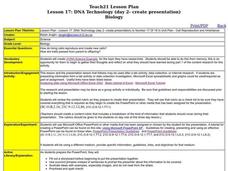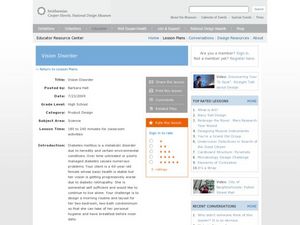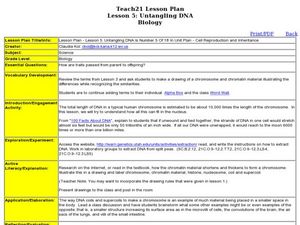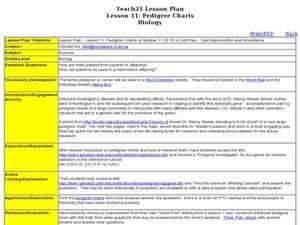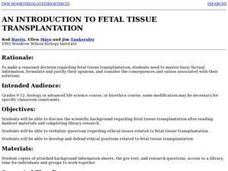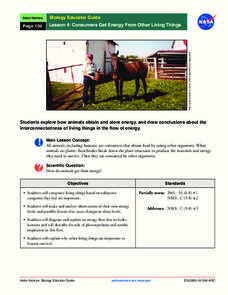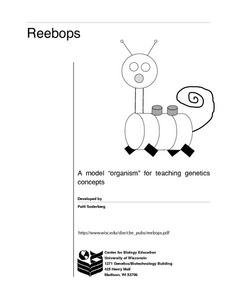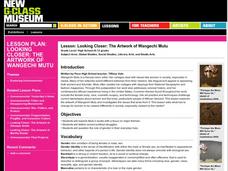Curated OER
Displaying Populations: Jellybeans, Paper and People
Students investigate the factors affecting population growth. In this biology lesson, students collect data from the lab and graph them. They estimate population size using a mathematical formula.
Curated OER
Lesson 14: Genetic Disorders
Learners create PowerPoint presentation on the topic they researched. In this biology lesson, students fill out a storyboard about their topic. They share their project in class.
Curated OER
DNA Technology
Young scholars prepare PowerPoint presentation on DNA and cells. In this biology lesson, students create a storyboard of their presentation. They share the finished project in class.
Curated OER
DNA Technology
Learners summarize their classmates' presentation in class. In this biology lesson, students create a graphic organizer based on concepts presented. They discuss and share their organizer.
Curated OER
Lesson 2: the Cell Cycle
Students explain how cells reproduce. In this biology lesson, students explain the different stages of the cell cycle. They calculate the number of new cells produced.
Curated OER
Vision Disorder
Learners design a morning routine for a 60 year old female senior with vision disorder. In this biology lesson plan, students collaborate with their team to come up with possible solutions. They present at least two ideas of their design...
Curated OER
Lesson 5: Untangling DNA
Students extract DNA from split peas. In this biology lesson, students research how chromatin form into chromosomes. They draw the stages and present their work in class.
Curated OER
RNA
Young scholars explain how cells reproduce. In this biology lesson, students transcribe and translate a gene. They discuss and compare their answers in class.
Curated OER
Lesson 9: Visual Meiosis
Young scholars create a fictional organism. In this biology lesson plan, students predict the traits of resulting offspring. They complete activity worksheet and discuss answers in class.
Curated OER
Pedigree Charts
Students explain how offspring inherit traits from their parents. In this biology lesson, students investigate the genes for nicotine addiction using an interactive website. They construct a fictional pedigree using their chosen...
Curated OER
Space Exploration to Find Habitable Planets
Students explore space science by reviewing scientific vocabulary terms. In this planet identification lesson, students identify the nine planets in our solar system and discuss which ones could potentially harbor life at some point....
Curated OER
Recycling: The Way to Save...Fad or Fact
Pupils write stories about recycling and illustrate them. They examine various containers and determine whether or not they are recyclable. They make a chart about the containers and visit a recycling center.
Curated OER
An Introduction to Fetel Tissue Transplantation
Students explore fetal tissue transplantation. They research basic factual information and justify their opinions. They write a paper discussing their position. Students consider the consequences and values associated with their...
NASA
Producers Make Their Own Food
During an inquiry-based lesson, scholars decide which variable to test and then design an experiment to determine the needs of producers. After two weeks, they complete a full analysis and research paper.
NASA
Consumers Get Energy From Other Living Things
How do plants and animals get their food? Learn about where energy comes from, how animals store energy, and aerobic respiration, in a lesson that allows scholars to diagram energy flows.
Curated OER
Reebops a Model "Organism" for Teaching Genetics Concepts
Reebops are cute, marshmallow-based creatures that can be used to teach inheritance. Beginning biologists draw strips of paper that represent chromosomes from two envelopes, one for the father, and one for the mother. Each parent...
Curated OER
Pharmaceuticals and Treatments
Students perform an experiment involving reverse transcriptase-polymerized chain reaction HIV replication to better examine the biotechnology used by scientists in pharmaceutical research of infections diseases like HIV. Students examine...
Curated OER
Science Lesson for Grade 12
Twelfth graders perform dihybrid crosses and calculate phenotype and genotype ratios. For this series of science lessons, 12th graders explain the process of anodizing aluminum. They research on the benefits and harm caused by resonance...
Curated OER
Lesson: Looking Closer: The Artwork of Wangechi Mutu
Social issues of gender and media stereotypes, begins with a multi-sensory experience. Learners view the painting Backlash Blues and make critical comments based on what they see. They then read the Langston Hughes poem and listen to the...
Curated OER
National Marine Sanctuaries Fish
Information is provided on Gray's Reef, Florida Keys, and Flower Garden Banks marine sanctuaries. Young marine biologists then visit the FishBase and REEF databases to collect fish species information for each location. They then...
Curated OER
Genetics and DNA
Students describe the structure of DNA and its components and can comprehend that real DNA and its cartoon representation are very different. They are able to link DNA to genetic make-up.
Curated OER
DNA Extraction
Students explore biology by participating in a fun science experiment. In this DNA lesson, students discuss what DNA is and where it comes from. Students utilize two bananas, a blender and a microscope to view the DNA of a banana in class.
National Center for Case Study Teaching in Science
A Strange Fish Indeed
Communication is one of the most important aspects of science. In a two-day activity, your high school or college-level biologists will read excerpts from a fictional diary of Marjorie Courtenay-Latimer, the woman who discovered the...
Curated OER
Phototaxis
Students conduct lab experiment to answer the question: How will starving Dictyostelium Discoideum Slugs respond to white light? They determine whether the slugs are attracted to or repelled by the light.




